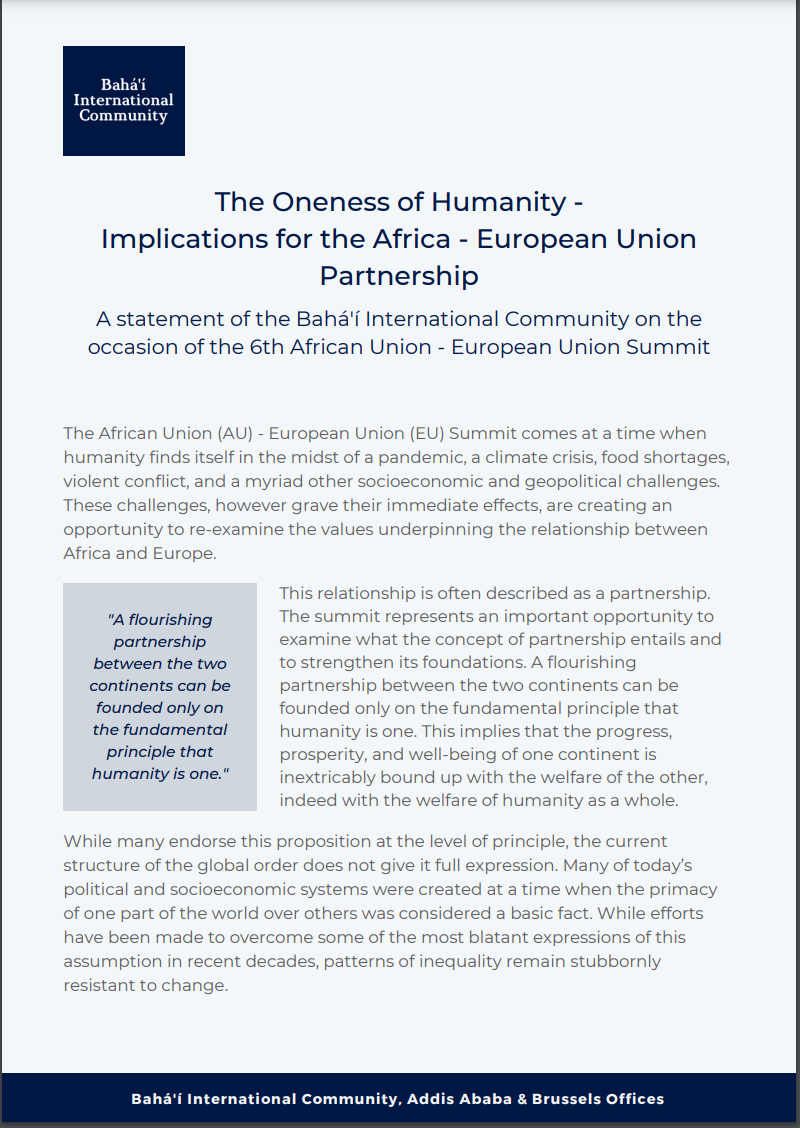The Oneness of Humanity - Implications for the Africa - European Union Partnership
A statement of the Bahá'í International Community on the occasion of the 6th African Union - European Union Summit
The African Union (AU) - European Union (EU) Summit comes at a time when humanity finds itself in the midst of a pandemic, a climate crisis, food shortages, violent conflict, and a myriad other socioeconomic and geopolitical challenges. These challenges, however grave their immediate effects, are creating an opportunity to re-examine the values underpinning the relationship between Africa and Europe.
This relationship is often described as a partnership. The summit represents an important opportunity to examine what the concept of partnership entails and to strengthen its foundations. A flourishing partnership between the two continents can be founded only on the fundamental principle that humanity is one. This implies that the progress, prosperity, and well-being of one continent is inextricably bound up with the welfare of the other, indeed with the welfare of humanity as a whole.
While many endorse this proposition at the level of principle, the current structure of the global order does not give it full expression. Many of today’s political and socioeconomic systems were created at a time when the primacy of one part of the world over others was considered a basic fact. While efforts have been made to overcome some of the most blatant expressions of this assumption in recent decades, patterns of inequality remain stubbornly resistant to change.
Reshaping international structures and relationships according to the principle of humanity’s oneness is a challenging task that will require effort over generations. However, there are some initial steps that can be taken towards this goal in the context of the partnership.
First, the principle of oneness implies a reordering of priorities in the process of making policy and devising strategy. The advancement of the global common good must be approached as a primary objective, one no less important than securing national or regional interests. Leaders and policymakers are confronted with a critical question in considering the merits of any proposed action, be it national or international: will a decision advance the good of humankind in its entirety? In policy areas as diverse as agriculture, trade, and finance, the starting point for both the design and the evaluation of any program or policy must be consideration of the impact it has on all segments of society in Africa, Europe, and across the world.
The EU has developed a set of tools to facilitate effective policy development and to assess the impact of its policies. The Better Regulations Guidelines, for instance, express the need to “assess impacts from the point of view of society as a whole,” stating that “the basic rule is to consult broadly and transparently among stakeholders who might be concerned with the initiative, seeking a whole spectrum of views”. In an interconnected world, EU policies and strategies have global impacts. As a result, policy guidelines should incorporate a commitment to thoroughly understand, and then act upon, the effect of European policies on other continents, including Africa.
